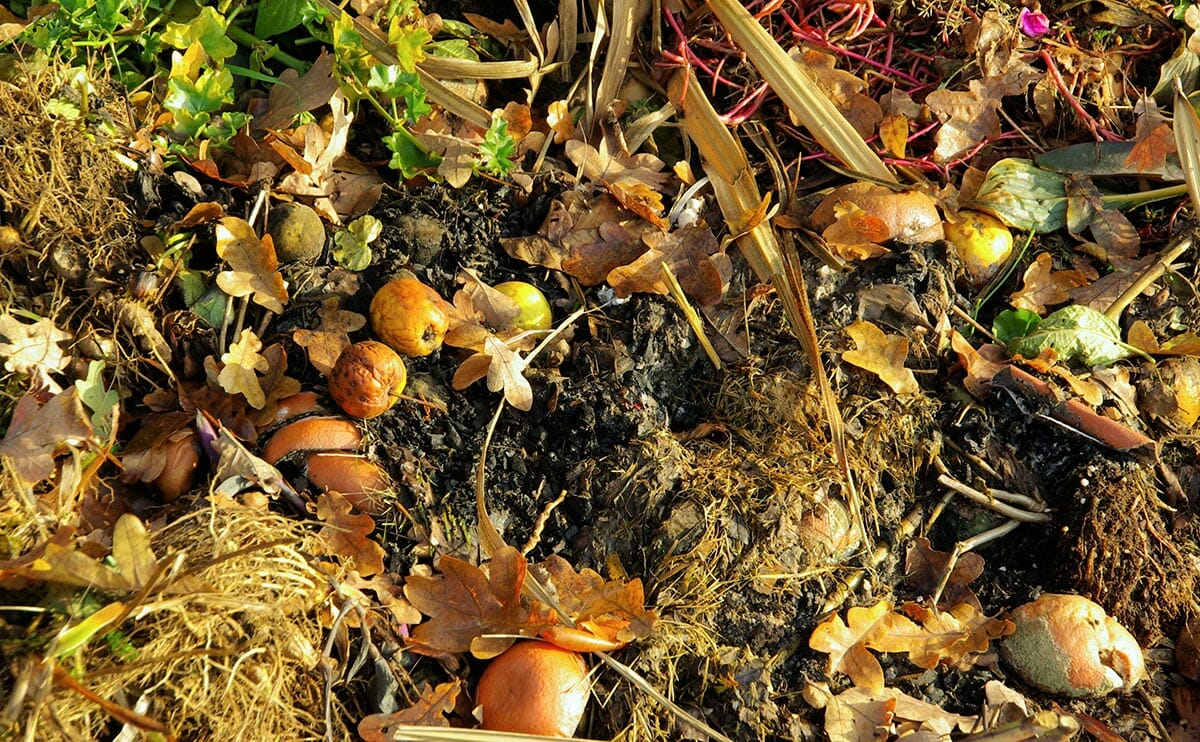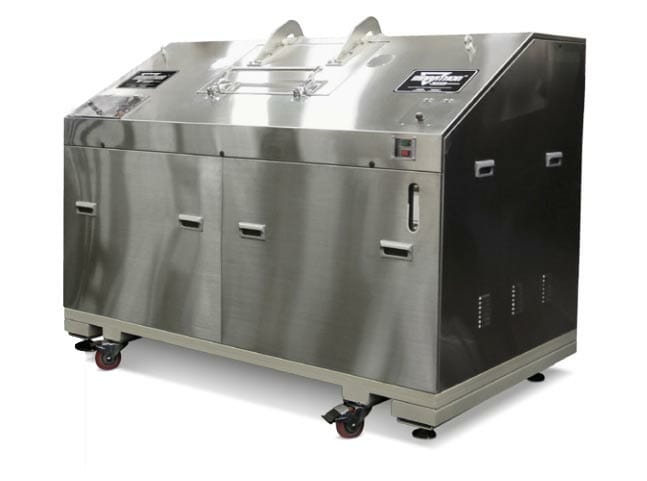Behold: The Lean, Green Food-Eating Machine
Meet the Eco-Safe Food Digester, a stainless-steel machine that uses microorganisms to break down large volumes of food by aerobic digestion — just like your stomach.
Behold: The Lean, Green Food-Eating Machine
Meet the Eco-Safe Food Digester, a stainless-steel machine that uses microorganisms to break down large volumes of food by aerobic digestion — just like your stomach.

Last week, the USDA and the EPA nudged the issue of food waste back into the public consciousness by launching the U.S. Food Waste Challenge, an initiative to get food manufacturers, processors, and retailers, as well as government agencies and regular citizens to reduce, recycle, or recover food headed for landfills. It’s a timely challenge: we Americans are a wasteful lot. In 2010, an estimated 133 billion pounds of food from stores, homes, and restaurants went to the dump, and we currently waste around 30 to 40 percent of our food supply.
Just as the environment and economy will likely benefit from a reduction in food waste, so too will the companies whose business it is to create the technology that keeps food out of landfills. Among them is BioHitech America, a New Jersey-based firm that sells the Eco-Safe Food Digester, a stainless-steel machine that uses microorganisms to break down large volumes of food by aerobic digestion. Although it’s not a compost machine, the Eco-Safe was created with the same goal in mind, and has the added benefit of eliminating the need for an outdoor composting site, or for transporting compost. We spoke with Lisa Giovannielli, BioHitech’s director of marketing, to learn more.
Modern Farmer: So how does the Eco-Safe work?
LG: It sits in a kitchen usually, in let’s say a prison, hospital, hotel or supermarket, where they generate a lot of food waste. It looks like an ice machine; you open up the door and inside are wood chips and a mix of different live organic microorganisms that eat different categories like proteins, fats, fruits and vegetables. They act like your stomach does: they digest food into a liquid that goes through a strainer and down a drain, so what’s left inside afterwards is wood chips and organisms looking to be fed again. The machine can eat all day, and handle up to 2,500 pounds a day of food waste. Then the liquid can go to a waste water treatment plant where it’s cleaned up and turned into different things. So we’re basically turning food into water, because food is mostly water; watermelon is, like, 90 percent water. The most important part is it’s taking food waste out landfills, and it’s not being trucked around to turn into something useful.

MF: How many machines has your company sent out into the world?
LG: There are 215 machines right now. They’re all around the country and the globe: they have them in Israel, Lebanon, Dubai, Canada, the British Virgin Islands. Right now our biggest customer is the federal prison system; they have 85 machines. [In prisons] compost doesn’t work financially because you’re carting it off site; this way, you’re handling it right in kitchens.
MF: How long has the machine been around for?
LG: Just under ten years. It was first conceived in Korea and brought here about five years ago. We’re the exclusive distributors of the Eco-Safe Digester; this is all we do. There are a few other similar technologies out there, but our unique features is we have a scale on the machine that measures every single pound you divert. So at the end of the day you see you digested, like, 2,000 pounds, but it might be because you ordered too many oranges or produced too much soup. So it gives chef an idea of how to save money on the purchasing end.
MF: Has the growing attention being paid to food waste impacted your business?
LG: I would say that we’ve seen more of an interest. I guess people are reaching out to us because there are more waste bans that are coming to fruition in states like Massachusetts, Connecticut, California, and Vermont, where they’re banning organic food waste from going to landfills at future dates. People are starting to get their plans in place, so we’re getting lots of interest. The federal government, who gave us an order for 70 units, is thinking more about efficiencies and money. I would have to guess [the machine] would be more efficient within the campus of a federal prison, and it’s also creating green, if you will, or new jobs by affording the prison an opportunity without having to prepare land for compost, and teaching [inmates] tasks with large machines and how to service our machines; that’s something they can do outside or use to move into, say, working with HVAC systems because they’re similar.
MF: Who are your biggest clients?
LG: After the federal government, our next two biggest customers are supermarkets, which include Fairway and Shop Rite, and then the next would be the Cheesecake Factory. They’re installing [the machines] in all their new construction and retrofitting them into all of their locations. I would say they’re our biggest group. But we’re also in universities, hospital systems, and country clubs.
Follow us
This work is licensed under a Creative Commons Attribution-NoDerivatives 4.0 International License.
Want to republish a Modern Farmer story?
We are happy for Modern Farmer stories to be shared, and encourage you to republish our articles for your audience. When doing so, we ask that you follow these guidelines:
Please credit us and our writers
For the author byline, please use “Author Name, Modern Farmer.” At the top of our stories, if on the web, please include this text and link: “This story was originally published by Modern Farmer.”
Please make sure to include a link back to either our home page or the article URL.
At the bottom of the story, please include the following text:
“Modern Farmer is a nonprofit initiative dedicated to raising awareness and catalyzing action at the intersection of food, agriculture, and society. Read more at <link>Modern Farmer</link>.”
Use our widget
We’d like to be able to track our stories, so we ask that if you republish our content, you do so using our widget (located on the left hand side of the article). The HTML code has a built-in tracker that tells us the data and domain where the story was published, as well as view counts.
Check the image requirements
It’s your responsibility to confirm you're licensed to republish images in our articles. Some images, such as those from commercial providers, don't allow their images to be republished without permission or payment. Copyright terms are generally listed in the image caption and attribution. You are welcome to omit our images or substitute with your own. Charts and interactive graphics follow the same rules.
Don’t change too much. Or, ask us first.
Articles must be republished in their entirety. It’s okay to change references to time (“today” to “yesterday”) or location (“Iowa City, IA” to “here”). But please keep everything else the same.
If you feel strongly that a more material edit needs to be made, get in touch with us at [email protected]. We’re happy to discuss it with the original author, but we must have prior approval for changes before publication.
Special cases
Extracts. You may run the first few lines or paragraphs of the article and then say: “Read the full article at Modern Farmer” with a link back to the original article.
Quotes. You may quote authors provided you include a link back to the article URL.
Translations. These require writer approval. To inquire about translation of a Modern Farmer article, contact us at [email protected]
Signed consent / copyright release forms. These are not required, provided you are following these guidelines.
Print. Articles can be republished in print under these same rules, with the exception that you do not need to include the links.
Tag us
When sharing the story on social media, please tag us using the following: - Twitter (@ModFarm) - Facebook (@ModernFarmerMedia) - Instagram (@modfarm)
Use our content respectfully
Modern Farmer is a nonprofit and as such we share our content for free and in good faith in order to reach new audiences. Respectfully,
No selling ads against our stories. It’s okay to put our stories on pages with ads.
Don’t republish our material wholesale, or automatically; you need to select stories to be republished individually.
You have no rights to sell, license, syndicate, or otherwise represent yourself as the authorized owner of our material to any third parties. This means that you cannot actively publish or submit our work for syndication to third party platforms or apps like Apple News or Google News. We understand that publishers cannot fully control when certain third parties automatically summarize or crawl content from publishers’ own sites.
Keep in touch
We want to hear from you if you love Modern Farmer content, have a collaboration idea, or anything else to share. As a nonprofit outlet, we work in service of our community and are always open to comments, feedback, and ideas. Contact us at [email protected].by Rebecca Flint Marx, Modern Farmer
June 11, 2013
Modern Farmer Weekly
Solutions Hub
Innovations, ideas and inspiration. Actionable solutions for a resilient food system.
ExploreExplore other topics
Share With Us
We want to hear from Modern Farmer readers who have thoughtful commentary, actionable solutions, or helpful ideas to share.
SubmitNecessary cookies are absolutely essential for the website to function properly. This category only includes cookies that ensures basic functionalities and security features of the website. These cookies do not store any personal information.
Any cookies that may not be particularly necessary for the website to function and are used specifically to collect user personal data via analytics, ads, other embedded contents are termed as non-necessary cookies.